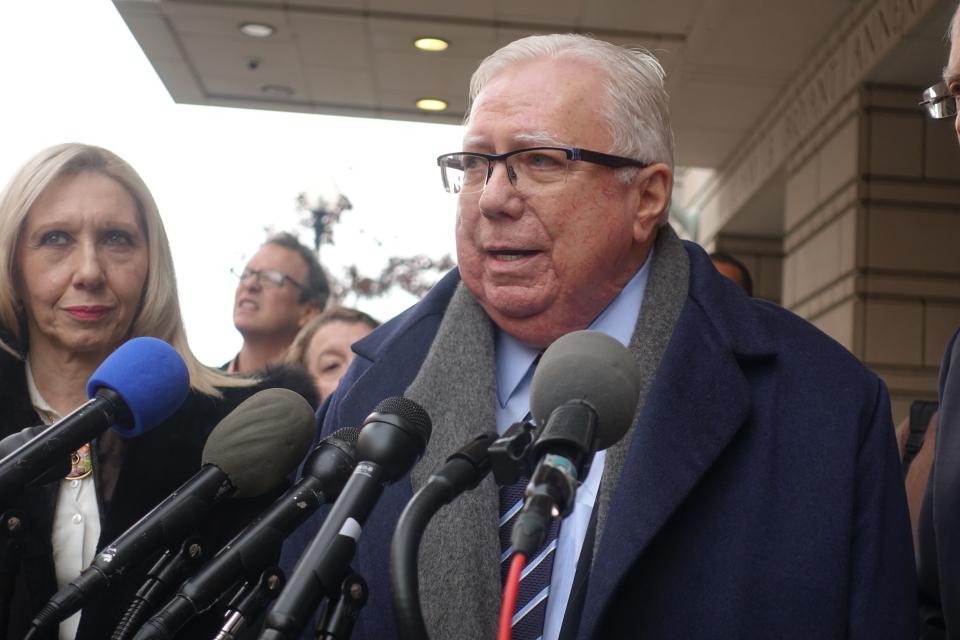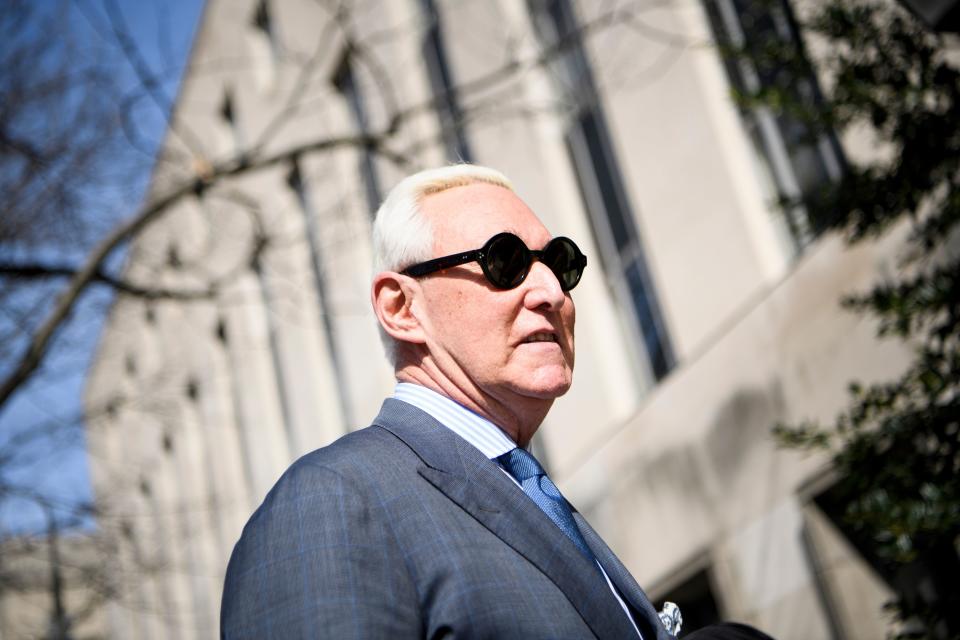'It is indescribable': How a harassment campaign overwhelmed Seth Rich's friends and family
This is the sixth and final part in the Yahoo News “Conspiracyland” series. Read and listen to the first five parts here.
WASHINGTON — Aaron Rich had finally had enough. For months, he listened in disbelief as an internet conspiracy entrepreneur named Matt Couch had posted reckless claims on social media accusing him of complicity in the events that led to the July 2016 murder of his brother, former Democratic National Committee staffer Seth Rich.
As Aaron Rich saw it, the rantings of Couch — a onetime sales manager in the Arkansas Ozarks whose relentless tweeting and aggressive support of President Trump had garnered him more than 100,000 Twitter followers — couldn’t have been more offensive. With no evidence to back up his claims, Couch charged that Aaron, an IT specialist for Northrop Grumman in Colorado, had worked with his brother to steal internal DNC emails and then sell them to WikiLeaks.
So, on Dec. 21, 2017, Aaron sent Couch an angry, but poignant, letter pleading with him to stop.
“Let me state this as clearly as I can: your accusations are completely false, and you should be ashamed of yourself for dragging my name through the mud to advance a political cause,” Rich wrote in his letter.
“I ask you to think about your experience as a husband, father, and son, and treat us how you would want to be treated if you had lost a loved one. If your brother was murdered, I wonder how you would feel if some person you had never met started publishing videos claiming to have ‘evidence’ that you had participated in your brother’s murder.”
Download or subscribe: “Conspiracyland” on Apple Podcasts
Couch’s response was contemptuous. He read Rich’s letter aloud on an interactive Twitter video-streaming platform, joking about whether the letter was laced with ricin or anthrax. Then he taunted Rich, demanding to know why he hadn’t turned over his deceased brother’s personal property — including his laptop and phone records — to Couch’s team of self-appointed investigators working for an outfit he created called the America First Media Group, and he used Rich’s letter to make a fundraising pitch that offered America First Media T-shirts in exchange for donations to continue his “investigation” into Seth Rich’s death.
“It’s infuriating,” Aaron Rich said in an interview. “The different feelings that you go through watching someone profit off of lies about you and your family — it is indescribable. You want to punch a wall.”
The harassment of Rich — as well as other family members, friends and neighbors of Seth Rich — is the subject of “Collateral Damage,” the sixth and final episode of “Conspiracyland.” It is an episode that illustrates a broader phenomenon in America’s social media-driven conspiracy culture: cruel attacks on the families, friends and associates of the innocent victims of random acts of violence.
“Pretty much everyone who loses a loved one in a mass shooting that gets a significant amount of media attention is at some point told that their family member was a crisis actor who didn’t really die,” says Anna Merlan, author of a new book, “Republic of Lies: American Conspiracy Theorists and Their Surprising Rise to Power.”
“Unfortunately, in this country we have a pretty tidy little conspiracy cottage industry that is devoted really to hounding people who have lost loved ones in violent ways. And Aaron and [parents] Joel and Mary Rich were a very unique example of that.”
The new “Conspiracyland” episode traces some of the earliest attacks on the Rich family to a May 29, 2017, episode of “Stone Cold Truth,” the podcast hosted by Roger Stone, President Trump’s longtime political adviser now facing charges of lying to Congress. That podcast was just six days after Fox News had retracted its bogus story alleging that Seth Rich had leaked DNC emails to WikiLeaks, a subject that was explored on the fourth and fifth “Conspiracyland” episodes.
The retraction was one of the biggest embarrassments in the history of America’s most-watched cable news network, all the more awkward because its star nighttime host, Sean Hannity, had promoted the phony story into the media stratosphere. But Stone and his guest that day — arch conspiracy theorist Jerome Corsi — were not going to back off the story.

Just five years earlier, Corsi had been one of the country’s most vigorous promoters of “birtherism,” the false claim that then-President Barack Obama hadn’t been born in the United States. As Corsi acknowledges in a “Conspiracyland” interview, Trump — who also took up the birther cause in 2011 — consulted with him during this period, looking for information he could use to question Obama’s legitimacy as president.
“I believe Donald Trump called me … maybe four times during 2011,” Corsi recalled. “He was looking at the issue and he wanted to discuss it.”
By 2017, Corsi had taken up the Seth Rich conspiracy. “Seth Rich was not a hacker, he was a leaker,” Corsi said on Stone’s podcast that day. “He got [Hillary Clinton campaign chairman John] Podesta’s emails. No one else had Podesta’s emails … and he released them to WikiLeaks.”
There was in fact no evidence at all that Rich had any contacts with WikiLeaks, as Deborah Sines, then the assistant U.S. attorney in charge of the Rich investigation, told “Conspiracyland.” There was also nothing to back up Stone’s claim on that same show that Rich had “indisputably headed” the DNC IT division, where the emails published by WikiLeaks had come from. In fact, Rich had worked as a data director in the party’s voter-protection division, an entirely separate department that gave him no access to the emails on the DNC server.
But the facts notwithstanding, Stone’s podcast chat with Corsi pushed the Rich story in a new direction. The host accused Rich’s parents, Joel and Mary, of participating in a cover-up by pleading with the media to stop perpetuating conspiracy theories about their son’s murder. It was a plea, Stone argued, that should be ignored.
“Now, I respect their right to privacy,” Stone said about the Riches. “But in my opinion the American people’s right to truth trumps their right to privacy.”

Within months, the cover-up allegations would be redirected toward Aaron Rich — trumpeted most prominently by Couch with the encouragement of a new confederate, Ed Butowsky, the Dallas financier who had played a crucial role in the retracted Fox News story.
One reason Aaron Rich came in their cross hairs is that after his brother’s murder — in what Washington, D.C., police quickly concluded was most likely a botched street robbery — he took custody of his brother’s property, including his laptop, phone and financial records. All of that was turned over to the D.C. police, which had twice examined the laptop and found nothing suspicious.
But Couch argued there must have been something compromising because Aaron Rich hadn’t released his brother’s records to Couch and his motley team of investigators. “Aaron — you won’t release the phone records,” Couch said as he read Rich’s letter to his Twitter followers. “Aaron, you won’t release the laptop, you won’t release the phone, you won’t cooperate with investigators, so — yeah, we have said you’ve covered things up.”
Such reasoning is typical of modern-day conspiracy theorists, according to Meryl Governski, a lawyer who is representing Aaron Rich in a defamation suit he filed against Couch and Butowsky.
“In this age of internet conspiracy theories,” Governski said, “an individual like Matt Couch can invent a story and then demand that a private citizen turn over proof to him to prove his innocence. He essentially is asking Aaron to give him his bank records in order to disprove a concocted narrative.”
But Couch did not stop with Aaron Rich. He also targeted friends of Seth Rich, such as Joe Capone, who had been the manager of Lou’s City Bar, Rich’s favorite Washington, D.C., hangout where he had been drinking the night of his death.
On July 6, 2016 — just four days before Seth Rich’s murder — Capone had taken his daughter and a friend on a public tour of the White House. The internet conspiracy theorist detectives, led by Couch, soon discovered this and started targeting Capone. As Capone recalls it, the internet hordes charged that he was having secret meetings with operatives from Hillary Clinton’s campaign. To further highlight the matter, he said, they posted photos of his family on the internet.
“How would you like me to put your kids on the internet when they’re not involved in anything?” Capone said. “My family doesn’t need to hear this stuff. I haven’t done anything. Seth was my friend.”

Another target was Mark Mueller, a neighbor of Seth Rich who was the first on the scene the morning he was shot. Purportedly looking for clues about Mueller, the internet detectives started digging into his private life and posting their findings. On Twitter, Couch identified him as a “person of interest” in the Rich investigation.
“When they published the phone numbers and addresses of all my brothers and sisters and me, and my neighbors — that’s pretty vicious,” said Mueller (who is no relation to Robert Mueller, the special counsel in the Russia investigation). “They were coming at me in various ways, over and over again, contacting me through every one of my email accounts, and calling me at work and calling me at home and on my cellphone. It’s pretty intense.”
So intense, Mueller said, that he moved out of his house on weekends to escape the self-appointed investigators who were hounding him. He identified Couch as his chief tormentor.
Couch did not respond to multiple requests to be interviewed. But, facing the litigation from Aaron Rich, last month he wrote to the federal judge in charge of the case and promised to remove all content from his websites relating to Aaron Rich and was “even willing to issue an apology to Mr. Rich.” He made no reference to those like Mueller and Capone, who he had also claimed were part of the supposed cover-up.
And Couch made clear that Seth Rich himself was still fair game, recently telling a YouTube host who goes by “Space Shot 76” that he had big plans in the works.
“We’re going to do a Seth Rich video series, and we’re going to go piece by piece in the investigation there,” he said.
“Somebody is probably choking some Tums down in D.C. right now. We are in talks and we’re really close to having a book deal finalized as well. I’m going to write a book about the Seth Rich investigation as well.”
No matter how much the Seth Rich conspiracies have been discredited, Couch’s comments are a sign that they are not likely to go away anytime soon. And that is singularly depressing to Aaron Rich and his family.
“You figure the day your brother is killed is the worst day of your life — and it turned out it can actually go downhill from there,” he said. “I want to have a normal day again where I don’t have to be worrying about all this and who knows when that will be, or if it will ever be again.”
Cover thumbnail photo: Jerome Corsi, Roger Stone, Matt Couch and the late Democratic National Committee staffer Seth Rich. (Photo illustration: Yahoo News; photos: AP (2), pscp.tv, via Twitter)
_____
Download the Yahoo News app to customize your experience.
Read more from Yahoo News:
FBI document warns conspiracy theories are a new domestic terrorism threat
Marianne Williamson on reparations and her emails with Oprah
'It's blasted across America': How Fox and Sean Hannity amplified a Russia-fueled conspiracy
Democrats resume search for a 'smoking gun' to bring down Trump
PHOTOS: Ohio mass shooting leaves 10 dead including the gunman



